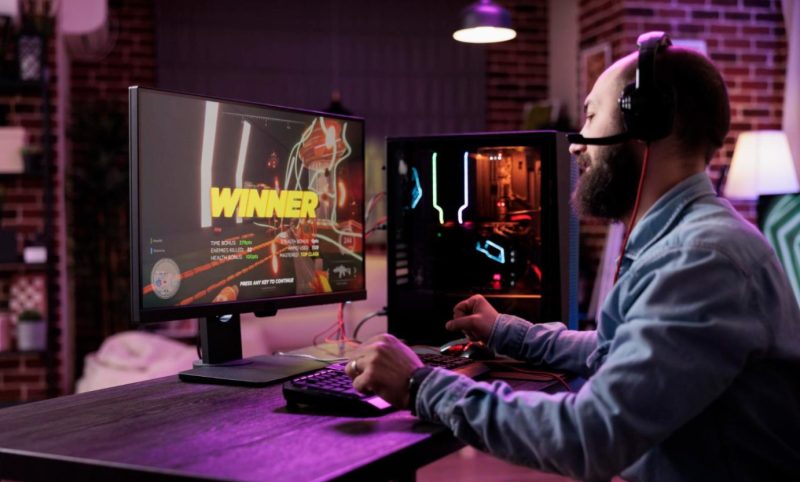
The world of gaming has evolved significantly over time, shifting from being a simple niche pastime to a popular form of entertainment. Even though gaming has its advantages, it’s important to consider the broader implications of excessive screen time and how it can affect us in various ways.
Many gamers enjoy the flexibility of playing games without being restricted by time limits since it lets them completely engage in their games without interruptions. For instance, those who participate in iGaming particularly find the appeal of casinos without limits on bets a dopamine rush and leisure activity.
Michael Graw from Value Walk says that these platforms offer players the freedom to make bets without constraints, a feature that can appeal to players who enjoy the thrill of high-stakes gaming. Similarly, gamers appreciate the ability to fully engage in gameplay without restrictions on time, often becoming so absorbed that they lose track of time and reach a state of immersion.
However, balancing freedom and responsibility is crucial when managing screen time to protect both mental health.
How Excessive Screen Time Impacts Health and Well-Being
Excessive screen time is a growing concern for health professionals and researchers.
Mental Health
- Too much time staring at screens has been connected to higher levels of stress and feelings of anxiety and depression. The research found that individuals who spend an excessive amount of time looking at screens have reduced gray matter volume in their brains, which is essential for memory and regulating our emotions.
- Excessive screen time can result in disruptions in behavior regulation and social skills while also affecting the quality of sleep, all factors essential, for maintaining mental health.
Physical Health
- Extended periods spent in front of screens, be it for gaming or other screen-related activities, can result in obesity and heart conditions caused by prolonged sitting and limited movement. Engaging in late-night gaming marathons may disrupt sleep routines and trigger insomnia along, with daytime fatigue and other sleep-related complications.
- Excessive use of screens may lead to eye strain and headaches well as physical issues, like back pain and carpal tunnel syndrome.
Cognitive Implications
Playing many video games has been associated with cognitive issues, such as a decreased attention span and a lack of focus. Studies reveal that spending too much time in front of screens can lead to a thinning of the brain’s cortex which is responsible for memory processing, such as making decisions and problem solving.
How to Implement Screen Time Limits
The recommended screen time limits for adults are generally guided by the need to balance screen use with other aspects of life, including work, physical activity, and social interactions.
Setting Time Goals
Experts suggest keeping screen usage to under two hours outside of work activities, like gaming and online gambling where you may consider capping your daily screen time to one to two hours per day.
Break up your gaming sessions into blocks of time, with short breaks in between to avoid sitting for extended periods at a stretch. For instance, consider having gaming sessions that last around 45 minutes to an hour and then taking breaks of 15 to 30 minutes in between. Doesn’t sound like much but this practice can reduce health risks and help you focus.
Using Technology to Set Limits
- Built-in features: Several gadgets and platforms come with installed tools that help you keep tabs on how much time you spend looking at screens and even restrain your usage if needed. For example, Microsoft’s Family Safety app lets you decide how long you can use apps and games on different devices, like Windows, Xbox, and Android.
- Screen time tracking apps: Apps such as Freedom or SelfControl can be really helpful in managing and reducing the amount of time you spend online each day! Apps like Moment also offer features, such as detailed usage reports, and can block specific apps or websites at certain times to help you stay focused.
- Screen-Free Zones and Times: Designate specific times when screens are not allowed to encourage healthier behaviors. For example, during meal times or in bedrooms for better sleep quality.
The Benefits of Screen Time Limits
Implementing screen time limits can help adult gamers maintain a healthy balance between their gaming habits and other aspects of life.
- Limiting gaming time can help reduce stress and anxiety associated with prolonged play. Balanced gaming habits can lead to improved mood and overall mental well-being.
- By limiting screen time, gamers are more likely to build healthier habits such as physical activities, improving their overall health. Adhering to screen time limits can help regulate sleep patterns and improve the quality of sleep.
- Reducing screen time allows for more face-to-face social interactions, which are crucial for emotional well-being. Setting limits ensures that gamers do not neglect work, school, or family responsibilities.
Conclusion
The debate over screen time limits for adult gamers is complex and multifaceted. While excessive screen time poses significant health risks, it is also important to respect the preferences of gamers who value the freedom and flexibility of unrestricted gaming. By understanding the health implications of prolonged gaming and implementing effective screen time limits, while maintaining a healthy balance with other aspects of life.
